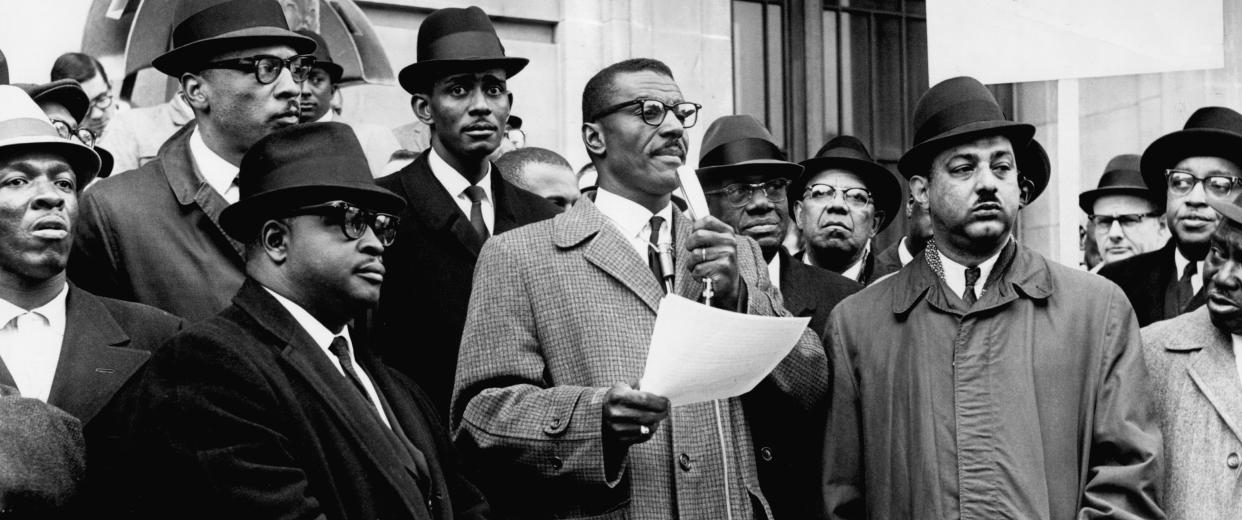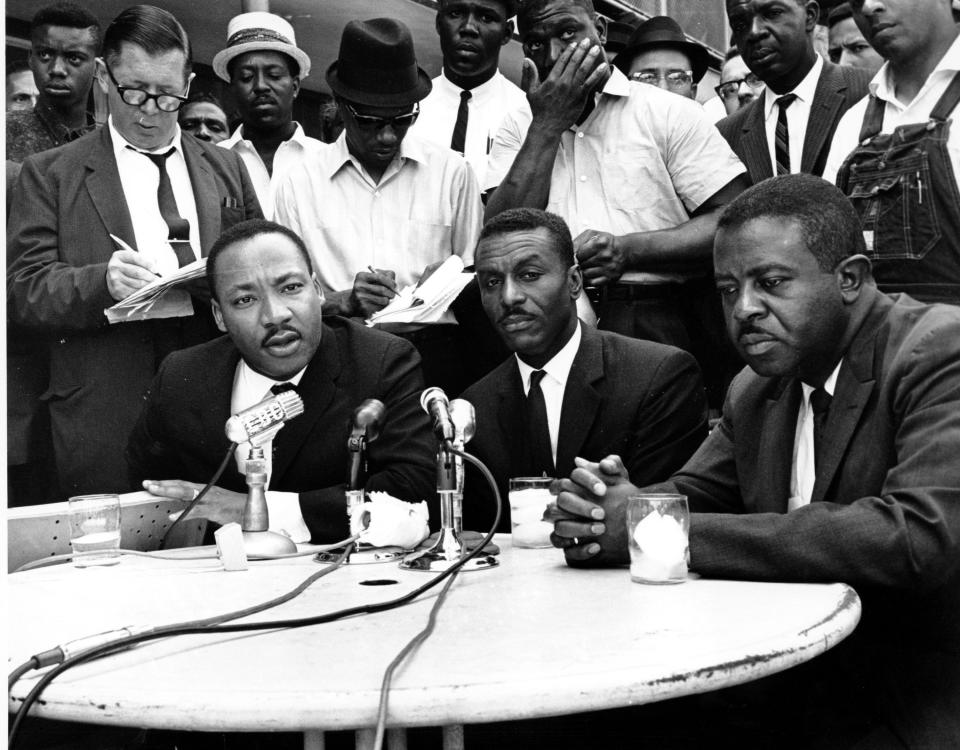60 years ago, MLK's 'I Have a Dream' followed a Cincinnati pastor's impromptu speech

- Oops!Something went wrong.Please try again later.
- Oops!Something went wrong.Please try again later.
This week marks the 60th anniversary of the Rev. Martin Luther King Jr. delivering his “I Have a Dream” speech, one of the most famous orations in American history.
His words spoken from the steps of the Lincoln Memorial on Aug. 28, 1963, were the most memorable part of the March on Washington for Jobs and Freedom, when more than 250,000 people converged on the National Mall in Washington, D.C., to pressure lawmakers to pass the civil rights bill proposed by President John F. Kennedy.
Thousands of people, Black and white, came from all over the country by train and bus. Many feared violence. Washington police mobilized 5,900 officers, and the National Guard sent 6,000 soldiers. But the demonstration was peaceful, if spirited.
The march showed the widespread support of racial change in America. (Although it would take the sentiment after Kennedy’s assassination to finally get the Civil Rights Act passed in 1964.)
But there was much going on that day besides King’s speech.
Also a part of that historic demonstration was a Cincinnati pastor, the Rev. Fred Shuttlesworth, who gave an impromptu speech before King took the stage.
From Birmingham to Cincinnati, Shuttlesworth was a civil rights leader
Shuttlesworth had been a leader of the civil rights movement in Birmingham, Alabama, in the 1950s. He co-founded the Southern Christian Leadership Conference in 1957 alongside King and Ralph Abernathy. He assisted the Freedom Riders bus trips through the South to protest the “whites only” segregation laws of the Jim Crow era.
His life was threatened. His family home was bombed. He was beaten by a mob of Ku Klux Klan members. Police broke up his demonstrations using dogs and fire hoses. He was arrested and jailed.

In 1961, Shuttlesworth was urged by his friend, the Rev. L. Venchael Booth of Zion Baptist Church in Avondale, to relocate to Cincinnati as the pastor of Revelation Baptist Church in West End, and he answered the call. (He also went on to found and lead Greater New Light Baptist Church in Avondale – now on Fred Shuttlesworth Circle.)
But Shuttlesworth continued to be heavily involved in the protests in Birmingham. In 1963, he led a campaign of boycotts and sit-ins known as Project C (for “confrontation”) and invited King to help. They both were arrested. The occasion led to King writing his “Letter from Birmingham Jail.”
A few months later, Shuttlesworth was also on hand for the historic March on Washington.
Cincinnatians joined in the march
A photo on page 1 of The Enquirer the day of the march showed a bustling Union Terminal scene – “reminiscent of World War II days,” the caption said – with mostly Black folks dressed in suits, preparing to board a special train from Cincinnati to the nation’s capital.

Among the 497 people from the region headed to Washington were all four Black candidates for Cincinnati City Council – Theodore Berry, Charles Collins, Buford Conley and Webster Posey – the president of the NAACP in Cincinnati, church leaders and Enquirer reporter Bob Webb.
Berry, who had been vice mayor from 1955 to 1957 and in 1972 would become Cincinnati’s first Black mayor, told The Enquirer that the marchers represented “business and professional people, students and people of all walks.”
“The march will give witness that the Negro is united in America. It will give expression to our unity of thought,” Berry said.
The Cincinnati contingent, led by the Rev. L. Richard Hudson, were near the front of the procession from the Washington Monument to the Lincoln Memorial.
Hear the speech 60 years later
Shuttlesworth was not scheduled to speak, but in the build-up to King’s speech, he was asked to say a few words. The preacher, accustomed to giving fiery sermons, quickly found his voice.
Webb briefly quoted from Shuttlesworth’s speech in The Enquirer.
But, other than those who were in attendance that day, few people had heard Shuttlesworth’s speech until 2013, when a broadcast of the event made by the Educational Radio Network was made available to the public from the GBH Archives for the 50th anniversary of the March on Washington.
It is a speech worth revisiting.
The 15 hours of tapes can be found online at the Open Vault from GBH website, openvault.wgbh.org/collections/march_on_washington/ern-coverage. (Shuttlesworth’s speech in Part 5 starts at about 19:00.)
The recording comes in after Shuttlesworth had already begun talking.
“… We realize that if freedom belongs to anybody, it belongs to everybody, and until everybody has freedom, nobody is really free.
“Somebody has said that there wasn’t any use of our coming to Washington, D.C. But you see, for years people from all over the world have been coming to Washington, D.C. And now, more than ever people from everywhere are coming to Washington, D.C., and we felt like other people that Washington, D.C., is a place to come.
“Now, we didn’t come to molest nor cajole. We came to be peaceful and loving and law abiding because we are a law-abiding people. We came because we love our country. We came because our country needs us and we need our country. But we came to serve notice today that if our country wants peace and tranquility and quiet, they might as well just free the Negro because until the Negro is free, nobody else will be free.
“We believe that the members of Congress – we think that Congress has a great responsibility today – can rise to meet the issues of this hour. And the issue is not whether there should be freedom or how much freedom to bring. We ought to go back and read first things first. All persons born or naturalized are citizens. And we ought not to be arguing at this point on how much freedom to grant whom. Everybody in America ought to be free!
“And our final words are this. This meeting today only serves to emphasize that most of the people in this country now are ready to do whatever it takes in a non-violent and religious and righteous way to be free.
“Now, in many places, the court’s calendars of the land are clogged. The police forces are being marshaled and lines are taut to keep people from trying to be free. The judges have their hands full and the politicians are worrying night and day. Now, if the politicians want to be free, or if they want peace, if the judges want to unclog their calendar, if the police want to be unfettered so that they can go ahead and hunt crooks because people who want to be free are not necessarily crooks, then we say turn the Negro loose and America will be free.
“We’re going to march. We’re going to walk together. We’re going to stand together. We’re going to sing together. We’re going to stay together. We’re going to moan together. We’re going to groan together. And after a while, we will have freedom, freedom, freedom now. And we all shall be free …”
His last words were drowned out by the crowd’s applause.
Shuttlesworth remained a major civil rights figure in Cincinnati for the next 50 years until his death in 2011.
Our History: MLK’s words heard and felt in Cincinnati
More Black history: ‘Amplifying the voices of those muted by history’: Challenges of researching Black history
This article originally appeared on Cincinnati Enquirer: MLK's 'I Have a Dream' followed a Cincinnati pastor's impromptu speech

